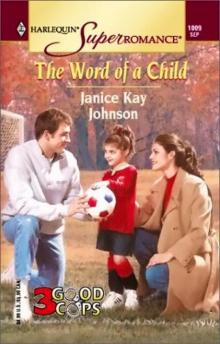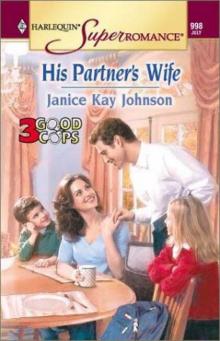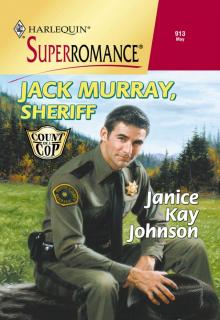- Home
- Janice Kay Johnson
Open Secret
Open Secret Read online
What was she waiting for?
Days later, Carrie was still asking herself. Why did she feel this wave of anxiety every time she thought about the phone number she carried in her wallet? Was she afraid her sister would be cheap and loud and uncultured, so she’d be ashamed of her heritage? But Mark had said she was nice. Carrie trusted him.
So, okay, maybe that wasn’t the problem. Maybe she was worried about whether her sister would like her. That somehow she’d be a disappointment.
Or maybe…maybe what really scared her was the possibility that she wouldn’t feel any connection at all to this sister. Maybe she’d look at photographs of her birth parents and not see herself in them either. And then she’d realize that there was no niche anywhere that she was designed to fit. She’d be like a puzzle piece that ended up in the wrong box and was left over when the picture was complete.
Dear Reader,
Growing up, I had a good friend who had been adopted as a baby. Thinking back, I’m amazed at how completely lacking in curiosity I was. I never wondered whether she imagined someday finding her birth mother, whether she lived with any sense of “not belonging,” even what she knew about her birth parents. So she was adopted. Who cared?
In some ways, this was undoubtedly a healthy attitude. Imagine what fun sleepovers we could have had, with me grilling her! On the other hand—why didn’t her unusual (to me) beginning in life stir my imagination?
Of course, it did, many years after the last time I saw her. Because babies in the womb hear their mothers’ voices for nine months, they feel a bond with her from the moment they’re born. If a child’s adopted out too young to remember her birth parents, does she nonetheless know, somewhere deep inside, that she’s not where she belongs?
If you’ve read many of my books, you’ll know how interested I am in the long-term impact of trauma. I tend not to write about the traumatic event itself; that’s way less interesting than the ripples that spread out from it!
But I am, after all, a romance reader and writer, which means I have enormous faith in the healing power of love. Don’t we all need that faith?
Best,
Janice Kay Johnson
OPEN SECRET
Janice Kay Johnson
Books by Janice Kay Johnson
HARLEQUIN SUPERROMANCE
483—SEIZE THE DAY
561—HOME AGAIN
627—HER SISTER’S BABY
648—IN THE DARK OF THE NIGHT
677—HIS FRIEND’S WIFE
720—WHAT SHE WANTS FOR CHRISTMAS
736—THE MIRACLE BABY
758—BEAUTY & THE BEASTS
789—THE FAMILY NEXT DOOR
854—THE WOMAN IN BLUE
860—THE BABY AND THE BADGE
866—A MESSAGE FOR ABBY
889—WHOSE BABY?
913—JACK MURRAY, SHERIFF
936—BORN IN A SMALL TOWN
(anthology with Debbie Macomber & Judith Bowen)
944—THE DAUGHTER MERGER
998—HIS PARTNER’S WIFE
1009—THE WORD OF A CHILD
1040—MATERNAL INSTINCT
1092—THE GIFT OF CHRISTMAS
(anthology with Margot Early & Jan Freed)
1140—TAKING A CHANCE
1153—THE PERFECT MOM
1166—THE NEW MAN
1197—MOMMY SAID GOODBYE
1228—REVELATIONS
1273—WITH CHILD
HARLEQUIN SINGLE TITLE
WRONG TURN
“Missing Molly”
SIGNATURE SELECT SAGA
DEAD WRONG
CONTENTS
CHAPTER ONE
CHAPTER TWO
CHAPTER THREE
CHAPTER FOUR
CHAPTER FIVE
CHAPTER SIX
CHAPTER SEVEN
CHAPTER EIGHT
CHAPTER NINE
CHAPTER TEN
CHAPTER ELEVEN
CHAPTER TWELVE
CHAPTER THIRTEEN
CHAPTER FOURTEEN
CHAPTER FIFTEEN
CHAPTER SIXTEEN
CHAPTER ONE
HIRING A PRIVATE investigator took more courage than Suzanne Chauvin had known she possessed. The whole idea was utterly foreign to her. P.I.s snapped photos of half-naked husbands straying from their marriage vows in sleazy hotels, the kind with mirrors on the ceiling. They did stakeouts where they slumped low in their cars for hour upon hour. They wore trenchcoats and carried firearms.
She knew the images were silly and outdated, if ever accurate. Sam Spade. Still, consulting a P.I. felt…sleazy.
But the truth was, she’d tried everything she could do on her own. She would never find Lucien and Linette without help. She’d asked around, and this Kincaid Investigations was recommended over and over. They specialized in finding people, Suzanne had been told.
Even so, she hesitated. Bringing a stranger into her private life made her uncomfortable. And it was more than that! She’d be handing the whole task over to the investigator. Trusting him. She wasn’t very good at trusting people anymore.
She kept debating, putting off the decision. Maybe Lucien or Linette would come looking for her. She’d made sure that, if they did, she would be easy to find.
The only thing was, she’d been hunting for three years now. And they hadn’t come looking for her.
Another week went by, a month. Two months. Three.
It was a really lousy morning that provided the final push. Dumb little things added up. She’d taken a personal day from her job, with the intention of working around the house. She’d mow, put some bedding plants in, reorganize her kitchen cupboards. Positive stuff.
Instead she came out early to find garbage from the can she’d set out by the street last night strewn across her driveway by some wretched dog. Her bathroom trash, including some really, really personal items, was scattered over the next-door neighbor’s impeccably kept lawn. She pounced and managed to pick the embarrassing stuff up just before his garage door rose and he backed out in his gleaming, black pickup truck. There she stood in her oldest jeans, surrounded by garbage.
His window glided down. Tom Stefanec was already the bane of her existence. His lawn could have doubled for a putting green at Pebble Beach. His perennial bed was the envy of the neighborhood from spring through fall as wave after orchestrated wave of perfectly tended plants came into bloom. He jogged most mornings barely waiting for sunup. He kept his hair military short. Worst of all, this model of discipline and fitness had to have heard Suzanne’s awful, screaming fights with Josh, her now ex-husband.
She hadn’t been able to look her neighbor in the eye in years.
And, of course, his garbage can sat untouched, a bungee cord stretched over the lid to keep its contents safe. The dog knew better than to try to get at Tom Stefanec’s trash.
“You need a hand?”
Smiling weakly and probably unconvincingly, she said, “No, no, I’m fine. It’s my own fault for not making sure that miserable dog couldn’t get into my can.”
“If you’re sure…”
“I’m sure.”
With a whir, the window rolled up and the truck continued to back into the street. Once he was gone, she fetched gloves and picked up the rest of the litter, then wheeled her mower out. Pressed the button a couple of times to prime it and then yanked the cord. Nada. Again, and again. Prime. Pull. Prime. Pull.
Finally, exhausted, Suzanne had to concede that the piece of junk wasn’t going to start. Once again, she would have to remember how to fold the handle and then heave the monster into the trunk of her car. Being as this was the beginning of April, she would be told that they’d get to it when they got to it. In other words, several weeks would pass before she’d get the d
amn thing back.
Suzanne took a look at her patchy, scruffy, hummocky, dandelion-infested lawn and started to cry. She was completely, one hundred percent incompetent. A failure at everything that had ever mattered.
And getting the damn mower fixed and the lawn mowed wouldn’t help.
If she was ever going to turn her life around and regain a semblance of self-esteem, she had to succeed at something a heck of a lot more important than yardwork.
She had to keep the promise she’d made herself when she was a child.
Abandoning the mower on the lawn, she marched into the house, found the phone number she’d tucked away three months ago and called.
“I’d like to make an appointment.”
WHEN THE RECEPTIONIST informed him via intercom that his new client had arrived, Mark Kincaid closed the database of bankruptcies he’d been searching on his computer, glanced at his calendar to recall her name and rose to meet her.
Suzanne Chauvin. He had a quick picture of a petite, fiery Frenchwoman in a chic suit and heels, her sleek dark hair in a twist, her brown eyes magnificent, her lips painted scarlet.
He shook his head at his brief foray into fantasy. Of course, she’d be a dumpy dishwater blonde in snagged polyester pants.
Ms. Chauvin hadn’t been specific about why she needed an investigator, only that she was seeking a missing person. That could be anyone from a deadbeat ex-husband who was five years behind on his child support payments to a birth mother if she was adopted. He was doing a big business these days in adult adoptees looking for their birth parents as well as the reverse—parents, mostly mothers, looking for the kids they’d given up.
He went down the short hall to the waiting room. The nervous looking guy with a receding hairline and big patches of sweat under his arms had to be waiting for Mark’s partner. As far away from him as she could get and hidden behind a magazine was a woman.
“Ms. Chauvin?”
“Yes.” The magazine dropped and she sprang to her feet as if jerked upright by a puppeteer. “I…thank you.”
“I’m Mark Kincaid.” He held out his hand.
She shook, her hand dainty but callused in unusual places. “You’re the owner?”
“That’s right.” He gestured toward his office. “Come on back, and we’ll talk about why you’re here.”
She bit her lip, cast a longing glance at the door to the street, took a big breath and nodded. “Thank you.”
She walked ahead of him, giving him a chance to appraise her. No chic suit or scarlet-painted mouth, but otherwise she was intriguingly close to his fantasy. Suzanne Chauvin was a very pretty woman who looked as French as her name sounded. Her dark hair was indeed gathered at her nape, if not in a more elegant twist. She might be as old as thirty, if he was any judge, but still as delicate as fine porcelain. She wore a simple dress and sensible pumps and clutched a tote bag as if she thought a purse snatcher lurked in the doorway to the records room.
“Can I get you some tea or coffee?” he asked when she went to one of the two chairs facing his desk, hesitated, then sat, perched noncommittally on the edge.
She gave a tight shake of her head.
He settled into his own comfortable leather chair behind his desk. “What can I do for you, Ms. Chauvin?”
Her fingers worked the straps of the tote as if she were trying to knit them. “You were recommended to me as someone who specializes in finding missing persons.”
“That’s right.” He leaned back.
“I need to find my brother and sister. I…seem to have failed on my own.”
His interest waned. This sounded like a twenty minute job. Unless someone was trying real hard to stay hidden, they weren’t difficult to find in this day of internet databases. Borrow money, marry, divorce, have a child, vote, register a car or boat, pay taxes, join a hobby organization, all were like waving a red flag and saying, Here I am. Hell, stub your toe and you’d appear somewhere.
He nodded gravely and picked up a pen, poising it over a ruled yellow pad of paper. “How long ago did you lose touch?”
“Twenty-five years and four months ago.”
Surprised, he leaned back again. “But you can’t be more than…” He cleared his throat. “Late twenties?”
“I’m thirty-one years old, Mr. Kincaid.”
“So you were six.” Had her parents divorced and divvied up the kids? He knew it happened.
“Yes.” She hesitated. “This is…difficult for me. Finding them has been a personal quest. I don’t know if I’m comfortable handing it over to someone else.”
“Someone you don’t even know,” he diagnosed.
She nodded.
“That’s a decision only you can make. If I can help by answering questions, I will.”
“No, I…” Ms. Chauvin gave a small, twisted smile. “You do come highly recommended. And I’ve failed. Maybe that’s what I hate to admit.”
“Tell me the story,” he said. “And then what you’ve tried.”
“Our parents died in a car accident when I was six. I’m the oldest,” she explained. “Lucien, my brother, was three, Linette just a baby. Six months old. The only family left was an aunt and uncle who already had two kids of their own. They didn’t feel they could add three more children to their family. Or afford to feed them.”
He nodded.
“So they kept me, since I was the oldest and more aware of what was happening to us. They believed that Linette and Lucien would adjust more easily to new parents.”
God. He imagined the scene when a social worker arrived to take away the two younger children. Six-year-old Suzanne’s bewilderment and dawning understanding. He saw the car pulling away, the three-year-old’s tearstained face framed in the window. He could almost hear the girl’s hysterical cry, see her running after the car.
Suppressing a shudder, he said, “That must have been very difficult. For you, and for your aunt and uncle.”
“It was…heartbreaking.” She looked at him, but without seeing him. “I was the big sister. Mom always said, ‘Take care of your brother and sister.’ I was so proud that I was big enough to be trusted to take care of them.”
The things people did to their children with the best of intentions. He’d bet that mother would have given anything to take those words back, if she could have seen into the future. She’d doubtless never imagined herself and her husband both being snatched away, leaving a little girl who would have been in first grade believing that she should have been big and strong enough to hold on to her little brother and sister and somehow take care of them.
“Linette was asleep when they took her away. But Lucien kept asking why I wasn’t coming.” Her eyes swam with tears. “I was so scared, and so grateful I didn’t have to go away with strangers, too. And I felt horribly guilty because I was so relieved they’d chosen me.”
He swore.
She started, as if remembering he was there. “It was awful,” she said simply, wiping her eyes with her fingertips. “I swore that someday I’d find them. But then the years went by, and somehow I never did.”
“What made you decide the time had come?”
“I got a divorce three years ago. I’m not very close to my aunt and uncle, and I felt so alone.” She gave a small laugh. “That sounds pathetic. I’m sorry! It’s not as if I don’t have friends, but… I don’t know. I was left with this huge chasm inside. I felt empty.”
Uh-oh. Unrealistic expectations always scared him. Adoptees invariably believed that finding their birth mothers would somehow make them feel whole. It was common to imagine scenarios rather like those in a romance novel. The adoptee believed that the moment he saw this woman, his mother, he’d recognize her, on the most fundamental level. The connection would be magical. All the hurt would be erased, difficulties in trusting people, in finding intimacy, would be healed.
On the one hand, he did believe the seeking and finding were healthy steps for an adoptee or a birth parent. Even if the relationship ult
imately went nowhere, disappointment could provide closure. If he didn’t believe that, he wouldn’t help.
But no stranger, blood relative or not, could fill the emptiness this woman felt inside herself. And it wasn’t fair of her to ask anyone else to do that, or to feel hurt and angry when they couldn’t or didn’t even want to try.
“Let me ask you a few things,” he said.
She started to open the tote. “I have notes…”
“Not that. Not yet. It’s you that concerns me.” When she looked at him, startled, he told her, “I’ve been doing this for some years now. First you need to know that sometimes I don’t find the person I’m looking for. The trail is just too cold. Most of the time I do. But what I find isn’t always what the seeker is hoping for.”
She opened her mouth, but he shook his head.
“No, let me finish. A couple of years ago, I was hired by a woman who’d given up her baby boy when she was sixteen. Her parents and everyone else convinced her he’d have a better life with a stable family. I was able to trace him. The adoptive father had abused him. He’d died in that adoptive home six months after she signed the adoption papers.”
Suzanne Chauvin stared at him, aghast.
“I’ve found birth mothers who refused any contact with their children. Mothers who were prostitutes. Turned out one had given up five babies for adoption over the course of eight years. I initiated contact to say that her daughter hoped to meet with her, and she said, ‘Which daughter?’”
The woman across from him asked, in a wounded voice, “Why are you telling me this?”
“Because I want you to go into this with clear eyes.” He leaned forward to emphasize his point. “What do you expect at the end of this search, Ms. Chauvin?”
“I…” she faltered. “To see them, of course. To talk to them.”
He waited.
“To know what’s happened to them. That they’re all right.” She bit her lip. “To say I’m sorry.”
“You were six years old.”

 Home Deadly Home
Home Deadly Home From Father to Son
From Father to Son All the Lost Little Horses (A Desperation Creek Novel Book 2)
All the Lost Little Horses (A Desperation Creek Novel Book 2) Hide the Child
Hide the Child Within Range
Within Range Between Love and Duty
Between Love and Duty First Comes Baby
First Comes Baby Charlotte's Homecoming
Charlotte's Homecoming In A Heartbeat (HQR Superromance)
In A Heartbeat (HQR Superromance) The Call of Bravery
The Call of Bravery In Hope's Shadow
In Hope's Shadow Anything for Her
Anything for Her Harlequin Superromance September 2014 - Bundle 1 of 2: This Good ManPromises Under the Peach TreeHusband by Choice
Harlequin Superromance September 2014 - Bundle 1 of 2: This Good ManPromises Under the Peach TreeHusband by Choice The Baby Agenda
The Baby Agenda More Than Neighbors
More Than Neighbors Her Amish Protectors
Her Amish Protectors All That Remains
All That Remains Whisper of Revenge (A Cape Trouble Novel Book 4)
Whisper of Revenge (A Cape Trouble Novel Book 4) In a Heartbeat
In a Heartbeat A Mother's Claim
A Mother's Claim Because of a Girl
Because of a Girl Back Against the Wall
Back Against the Wall Dangerous Waters
Dangerous Waters Mommy Said Goodbye
Mommy Said Goodbye A Mother's Secret
A Mother's Secret See How She Runs (A Cape Trouble Novel Book 2)
See How She Runs (A Cape Trouble Novel Book 2) Plain Refuge
Plain Refuge Bringing Maddie Home
Bringing Maddie Home For the Girls' Sake
For the Girls' Sake Through the Sheriff's Eyes
Through the Sheriff's Eyes Yesterday's Gone (Two Daughters Book 1)
Yesterday's Gone (Two Daughters Book 1) All a Man Is
All a Man Is Harlequin Superromance January 2014 - Bundle 1 of 2: Everywhere She GoesA Promise for the BabyThat Summer at the Shore
Harlequin Superromance January 2014 - Bundle 1 of 2: Everywhere She GoesA Promise for the BabyThat Summer at the Shore No Matter What
No Matter What Wakefield College 01 - Where It May Lead
Wakefield College 01 - Where It May Lead Someone Like Her
Someone Like Her THE WORD OF A CHILD
THE WORD OF A CHILD Harlequin Superromance May 2016 Box Set
Harlequin Superromance May 2016 Box Set Open Secret
Open Secret The New Man
The New Man Finding Her Dad
Finding Her Dad The Perfect Mom
The Perfect Mom All Through The House
All Through The House Match Made in Court
Match Made in Court Making Her Way Home
Making Her Way Home From This Day On
From This Day On To Love a Cop
To Love a Cop The Hero's Redemption
The Hero's Redemption HIS PARTNER'S WIFE
HIS PARTNER'S WIFE Jack Murray, Sheriff
Jack Murray, Sheriff Dead Wrong
Dead Wrong Twisted Threads (A Cape Trouble Novel Book 3)
Twisted Threads (A Cape Trouble Novel Book 3) Bone Deep
Bone Deep The Closer He Gets
The Closer He Gets With Child
With Child Whose Baby?
Whose Baby? Kids by Christmas
Kids by Christmas